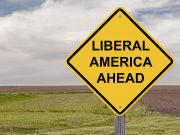Does the New Right have the elite it needs?
Classical Liberalism versus Anarchism
Over at the Independent Institute’s blog, Robert Higgs criticizes classical liberalism from an anarchist perspective. He writes that he can understand why one would become a classical liberal – someone who favors liberty and believes that government can be limited and help protect that liberty. In fact, he became a classical liberal more than 40 years ago. But what he does not understand is why classical liberals remain so rather than rejecting government entirely:
My difficulty arises not so much from a dissatisfaction with government’s being charged with protecting the citizens from force and fraud, but from a growing conviction that government (as we know it) does not, on balance, actually carry out these tasks and, worse, that it does not even try to carry them out except in a desultory and insincere way—indeed, as a ruse.
Truth be told, government as we know it never did and never will confine itself to protecting citizens from force and fraud. In fact, such government is itself the worst violator of people’s just rights to life, liberty, and property. For every murder or assault the government prevents, it commits a hundred. For every private property right it protects, it violates a thousand. Although it purports to suppress and punish fraud, the government itself is a fraud writ large—an enormous engine of plunder, abuse, and mayhem, all sanctified by its own “laws” that redefine its crimes as mere government activities—a racket protected from true justice by its own judges and its legions of hired killers and thugs.
Let’s assume that Higgs is correct – that government is the worst violator of rights. What is strange is that Higgs seems to be missing an essential step in his argument. He does not discuss what the world would look like in the absence of government. My guess is that most classical liberals believe that, however bad government may behave in the real world, an anarchist world would be even worse.
Now, perhaps Higgs would disagree with this belief of classical liberals, but it seems noteworthy that he omits mentioning the belief. To the classical liberal, this would seem to be the key issue. Alternatively, Higgs may not necessarily disagree, but instead believe that government action that invades individual rights should not be endorsed, even if leads to fewer rights violations, because there are Nozickian side constraints about rights. (In other words, he does not favor minimizing rights violations, but simply argues that entities should not violate rights.) Or perhaps Higgs believes both of these things.
Even though I believe actual governments regularly take harmful actions — and this includes governments in the freest and most prosperous countries – I also believe it is very likely that the absence of government would be worse. Whether I am right or wrong, however, to me that is the question.

